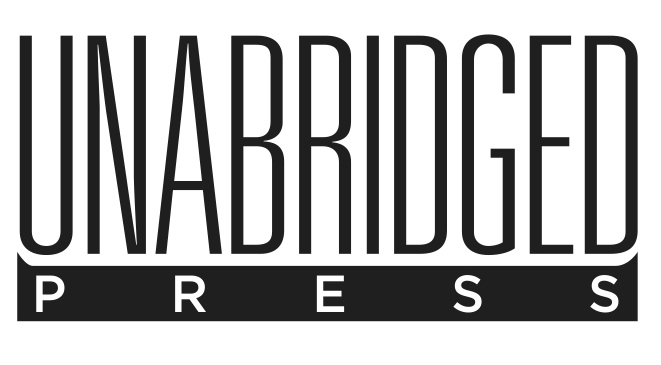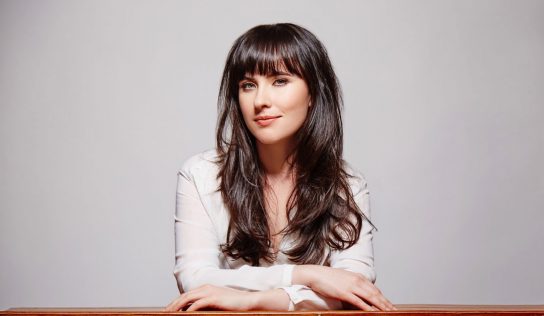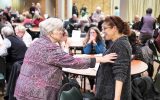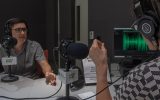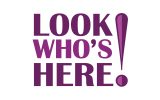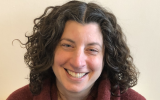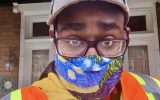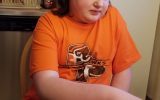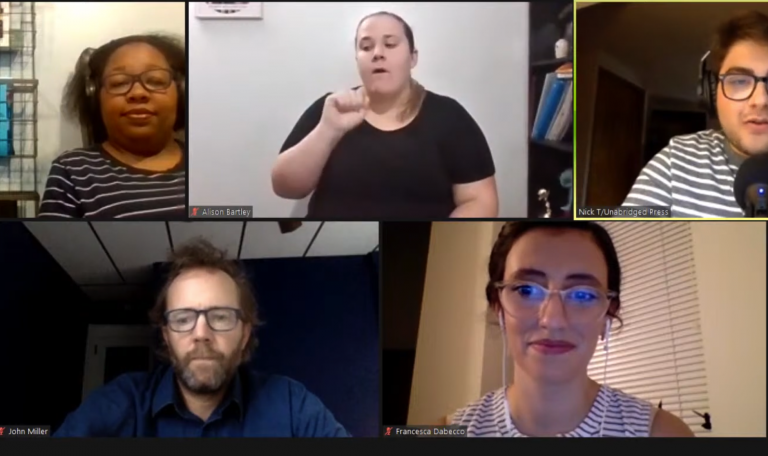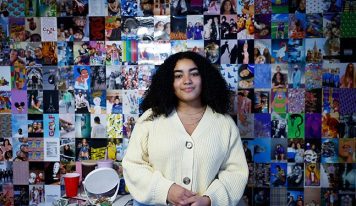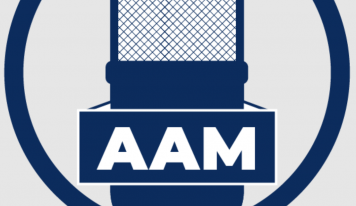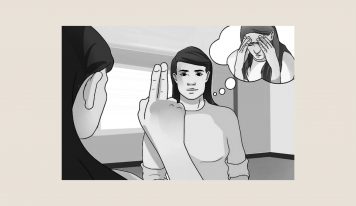DARAH THOMPSON (00:00): Hi, I’m Darah Thompson and this is A VALID Podcast. I am a light-skinned black girl with blue glasses, brown curly hair, and a purple and white snakeskin dress on. And I’m joined by my sister, Alana Gibbs.
ALANA GIBBS (00:20): Hi, I’m Alana. I am a brown-skinned, black girl, curly hair, blue top, white stripes, blue glasses.
DARAH THOMPSON (00:31): We have a great show for you today. We’re going to have a conversation and we’re going to get to know the crew of A VALID Podcast a little bit better. Some of our hosts and analysts, we’re also going to get a great tip from Erin Gannon.
ALANA GIBBS (00:44): I’m really excited to find out what her tip is for today.
DARAH THOMPSON (00:46): Me too. And then we have a great segment with our associate producer, Francesca and John. Francesca wrote an amazing piece about different technology that was created for people with disabilities, but we all benefit from.
ALANA GIBBS (01:04): Like?
DARAH THOMPSON (01:07): Texting! Can you imagine life without texting?
ALANA GIBBS (01:08): No I cannot, I send about a million texts every day.
DARAH THOMPSON (01:11): I know. Curb cut outs.
ALANA GIBBS (01:13): What? Hey, that’s a good one.
DARAH THOMPSON (01:16): I know. Pushing strollers, pushing your bikes,
ALANA GIBBS (01:18): Carts.
DARAH THOMPSON (01:19): Oh yeah. All amazing.
ALANA GIBBS (01:22): Where did you see this? Where’s this article? I feel like I need more. I want more.
DARAH THOMPSON (01:26): Well, I saw it on ADA Pittsburgh, but John Miller, our reporter, he is actually going to interview Francesca, which should be very interesting.
ALANA GIBBS (01:36): Yes. Francesca’s the best.
DARAH THOMPSON (01:37): I know. John, take it away.
JOHN MILLER (01:41): Hi everybody. I’m John Miller. I’m a white Belgian-American man with a beard and I own eye glasses and wearing a blue shirt today. People with disabilities live in the same world that everybody else does. So it’s no surprise that inventions like the text message, the segway curb cut outs, and even eyeglasses started out as ways of making the world more accessible for people with disabilities. And Francesca has reported a story on this phenomenon, which even has the name, The Curb-Cut Effect. Francesca, can you tell us more about this?
FRANCESCA DABECCO (02:17): So, I’m Francesca. I am a white woman with brown hair and brown eyes, and I’m wearing clear glasses and a white and blue stripe dress today. So this story I reported in partnership with unabridged press and public source for ADA Pittsburgh in honor of the 30th anniversary of the ADA. And so like you mentioned, John, it’s hard to imagine the world without those things like curb cuts, right? But we forget that disabled people fought to have curb cuts put in their cities. And they were really revolutionary to the accessibility for wheelchair users. But like Darah and Alana pointed out, they help more people than that. They help moms pushing strollers and people rolling luggage and even skateboarders.
FRANCESCA DABECCO (03:05): So this was actually written about in length by the national equity advocate, Angela Glover Blackwell. And what I read from her, she explained that this is an example of the curb cut phenomenon, because it reinforces that investment in one minority group can cascade beyond that, and that community to contribute to broader well being for everyone. So in the article, I mentioned a couple examples, a place that we see this a lot is actually in the kitchen. So things like pull down shelving and motion censored faucets, but also kitchen tools. So any time you walk into a store today, you’ll see can openers and vegetable peelers with wider grip, softer handles. And those were actually originally made to help people with arthritis, but doesn’t it make sense that it would help all of us?
JOHN MILLER (03:59): Absolutely and it’s a reminder that we’re all disabled in different ways and that we can all benefit from a world that’s more accessible, right?
FRANCESCA DABECCO (04:06): Yeah. I really liked the quote by designer Dan Formosa in my article, he said, “Design can include or exclude people if you’re alienating people who have physical challenges, it’s a form of segregation. Disability is determined by design.” And I really liked that point, because it really serves that when we are mindful of the design of things, we can actually help more people to live a more equal life. And I also spoke with Rory Cooper. He is the director of The Human Engineering Research Lab at Pitt, and his team develops robotic limbs and wheelchairs and other mobility devices. And he was actually involved in the original invention of something called the iBOT, which was able to climb stairs and traverse snow. And what’s interesting is that gyroscope technology that allowed the chair to balance on two wheels was actually recycled to create the Segway. You would have never thought.
JOHN MILLER (05:08): That’s fascinating and people can read your story where?
FRANCESCA DABECCO (05:11): At adapittsburgh.com.
JOHN MILLER (05:14): Well thank you for that. That’s absolutely fascinating.
FRANCESCA DABECCO (05:17): Yeah. Thanks. I think the important thing to keep in mind is that when we open our eyes to these things that we often take for granted in our lives, we can see just how important that disability technology and evolvements from the Americans with disability act actually help everyone day to day, so…
JOHN MILLER (05:40): The special thing about America too, I grew up in Belgium and in the 80s there were no curb cut outs at all. So when I came to the States as a kid, this was something that was unique and special.
FRANCESCA DABECCO (05:50): Yeah. And I don’t remember a time without curb cuts, but as some of our team members can probably explain, it’s transformed their lives. And it’s really important to just take a look, and look at these things and see how just the evolution can really create a more equal world for everyone. So before we move on to the next segment, I’d like to let you know where A VALID Podcast comes from, this show and the All Abilities Media project, are a public-private collaboration. They are co-produced by Unabridged Press an The Center for Media Innovation at Point Park University, that’s in downtown Pittsburgh. And support for our work is provided by the FISA Foundation, the Pittsburgh Media partnership and other funders. So you can learn more at avalidpodcast.com, excuse me. So I think Darah and Alana are going to join us and with our disability analyst, Alisha Grishman to talk more about what their disability has given and taken away in their lives just as a disability technology has. Go ahead guys.
ALANA GIBBS (07:03): Thanks, Francesca. That’s a very interesting information. I’m glad that all of those things have come about, because we really need it, the can opener. I honestly could not live without text messaging seriously, and a voice to text is my jam. Doesn’t always come out the best, where I would have to check it to make sure it’s right, but I use it a lot.
ALISA GRISHMAN (07:28): Well, it’s an interesting point, because we talk about the social model of disability and how your disability doesn’t come from something about you. It comes from the world around you. So, like in a world full of ramps and automatic doors, I’m not disabled, because I can get into every building with my wheelchair. And so my disability comes from the lack of accommodation. So, it’s interesting to think about that in terms of glasses, text messaging, and curb cuts. So I’ve been really enjoying actually all the stuff on adapittsburgh.com.
ALISA GRISHMAN (08:05): I was listening to your podcast earlier. And so I wanted to bring that up, because we all have in common, the fact that we have invisible disabilities, the fact that we were diagnosed with our disabilities later in life. You two both talked about that in the… Oh God, that was a powerful episode. I recommend it.
DARAH THOMPSON (08:30): Thank you.
ALISA GRISHMAN (08:30): But something I want to ask you, because you know, we’ve kind of touched on this, but we’ve never talked in depth about it, is disability pride and what that means to us. And so I wanted to start out throwing it to you, do you feel pride in or because of your disabilities?
ALANA GIBBS (08:56): That is a good question. So, I feel pride now. In the beginning, I didn’t, it took me a hot minute to get there because… So my disability is multiple sclerosis, and for a while, like when I heard that I didn’t think of it as a disability. I just thought it was something that I had. Like, I have a cold, I have MS. Then I learned more and did more research and heard a lot of negative stuff.
ALANA GIBBS (09:36): Then I heard a lot of positive stuff and it was the positive stuff that made me say, “This isn’t probably a club that I would necessarily want to be a part of, but I’m in it and go orange. We’re going to do the thing.” I just felt like, I want to be an example for the people who are not proud, who are feeling bad about it, who don’t have somebody who kind of looks like them to be like, “Oh, well she has it. And she can do blah, blah, blah. So, Hey, I’m going to try to, you know, do it too.” I don’t know if that really answered the question, but… [crosstalk 00:10:21]
ALISA GRISHMAN (10:22): I have multiple sclerosis as well. So, go orange, which for people not familiar, all the ribbons, different diseases have different colors and MS is loudly and proudly very, very orange. And for me at first, I had this fatalistic attitude towards everything that was going on. And I almost acted as if I was dying constantly. And it took a long time to both come to terms with it, but then to realize how much power I have being part of this community, because disabled people are fierce as hell. We have to be fierce, and I consider myself pretty awesome.
ALANA GIBBS (11:17): You are pretty awesome.
ALISA GRISHMAN (11:19): I know I’m full of myself [crosstalk 00:11:20]
DARAH THOMPSON (11:20):And I think you’re pretty great too. [crosstalk 00:11:23]
ALANA GIBBS (11:22): I was loving the blue hair. I usually rock with her myself.
ALISA GRISHMAN (11:30): But you know, all the things that I think are great about myself, the work that I do, the people I help, I never would have done if I weren’t disabled. So, like for me, that’s my pride in being disabled is the fact that it has made me… I’m awesome, because of my disability and not despite it, or in spite of it. So I know Darah, do you have similar experience?
DARAH THOMPSON (12:01): I do. So, not only do I now have pride, but I feel like my sister had so much pride in my disability. So, I was diagnosed with bipolar in my late 20s, and I wasn’t proud, I was shamed and embarrassed, but then I found awesome rock stars that also had bipolar disorder. And then I claimed it as my superpower. And I claimed how many people that I could help and impact. And I just went on a tear. I’m like, “I’m going to have this conference. I’m going to have this conference.” And she and my family, they got proud. She used to call me down to her beauty shop and be like, “I need you to talk to this person. I need you to help this person. We need to do this for this person.” In that I was able to take how messed up my life was and turn it into my mission.
DARAH THOMPSON (13:05): Yeah. And I started two companies all around it. All around helping and supporting folks with disabilities. So yeah. And it’s like, thinking back it’s insane to me, because when I was in the seventh grade, an interpreter came to my church and I said, “Oh, I want to learn sign language.” And then they said, “Oh, there is a slough of other disabilities.” And I said, “Oh, that’s what I want to do when I grow up.” And then low and behold, I went from working in the field to working in the field as one of its members, which… It’s awesome and amazing.
ALISA GRISHMAN (13:44): It’s really great. Like I always knew that disability existed, and even when I was first diagnosed with MS and I had some symptoms, but was pretty well hidden. And I didn’t quite consider myself disabled yet. After I kind of accepted the idea of disability, and became kind of loud and proud. It’s amazing how much my friends too, have really woken up to disability. I get text messages from people. Like I get messages from people I’ve known since college on Facebook, and I haven’t talked to in 10 years saying, “Hey, after seeing all your posts, they messed up this thing at a sidewalk cafe in my neighborhood. And I wrote my councilperson,” this is a true story. And it’s like, this is incredible. And it just makes me so proud of being able to make an impact on the world. It’s such an awesome feeling.
ALANA GIBBS (14:50): Hey, it’s definitely a go team type of thing. So, when I did my first MS Walk, well, we did our first MS Walk in, I believe 2017. So, I was diagnosed in 2016, 2017, my wrangler, because everything I get wrangled into, is because of this one. But she was like, “Oh my gosh, there’s the MS Walk. We have to do it.” I was like, “I don’t know. I’m kind of tired.” She was like, “They give you a medal.” I was like, “We’re in, we’re doing it.” Accessories, I’m all about it. But when we decided to walk, I was like, “Hey, we’re doing this walk.” It started out with like 10 people, then it was like 20 people. I think our last walk, we had 30 people that were just the A-team with our glittery shirts and we were marching proud and…
ALISA GRISHMAN (15:47): Oh, that’s awesome.
ALANA GIBBS (15:48): Yeah. Like I… Because in the beginning I was like, “I don’t know anybody else who has this, what am I going to tell my family? What am I going to tell my clients? Should I tell my clients, are they going to keep coming to me? If they, Oh, well, she’s sick. So, maybe I need to find another nail tech to go to.” But when I started telling people, when I got okay with it with myself, then I started telling people, then I just started sharing. Like, [crosstalk 00:16:20] I’m having an MS day.
ALISA GRISHMAN (16:22): Same, like my job. I worked in an outpatient psychiatric clinic. And I worked with doctors who understood MS. But I didn’t tell anyone for the first three years that I worked there. So yeah, once I started talking about it, it became easier to talk about.
ALISA GRISHMAN (16:44): So I was diagnosed in 2001, I was a baby, I was 19. And I will say, I am super proud of my first MS Walk. We raised $19,000.
DARAH THOMPSON (16:54): That’s awesome.
ALANA GIBBS (16:54): Wow.
ALISA GRISHMAN (17:00): 2002, we got the university on board and we had fundraisers at the university.
ALANA GIBBS (17:04): Go team orange.
ALISA GRISHMAN (17:07): That’s my claim to fame. And now I did do… So before I got my wheelchair, when I had just my Walker, I still ran an MS Walk team, but there was no way I could do any part of the walk. And so, I sent the rest of my team off walking. I stood at the finish line with a giant sign that said, thank you for walking for me.
ALISA GRISHMAN (17:31): So many hugs [crosstalk 00:00:17:33].
ALANA GIBBS (17:33): You just gave me all the feels right now.
ALISA GRISHMAN (17:35): It was the best day, because like people are doing such great things to help me. And of course I want to say, thank you. So thank you for everyone who walks for anything, but Oh my God…
ALANA GIBBS (17:47): I didn’t realize it would be such an emotional thing to walk over that finish line. Like even though at the time, I mean, not at the time I have the ability to walk. So walking across that finish line when there were so many other people who couldn’t, just was so overpowering and I was like, “Man, these are my people. I found my people.” Yeah. It was something.
ALISA GRISHMAN (18:13): Yeah. And I still have days where it gets so overwhelming. And I think all of us feel that way, especially disabled people where like, it is kind of hard to find that pride, because you feel kind of smushed down by it. Because like, I know I have a lot of days where I’m just in pain and there’s no other part of my existence. So, I don’t know if you guys have things like that, but I think what keeps me going is having friends like you where I know that I can talk about this sort of thing and be open and get that support. So, I don’t know if you have any, either experience with that or advice for anyone listening who might be feeling that, but…
ALANA GIBBS (19:01): Yeah. I would definitely say get your person or people who like… For me, with my MS, I have days where like, it hurts to simply like lift my head off the pillow, and then the thought [inaudible 00:19:19] be like, “Oh, you have to not propel yourself and get showered and go to work, and do all these things.” Where I can call up my sister or now I can call you and say, “Hey, I’m having a rough day and I’m exhausted.” And they’re not going to say, “Oh, well, I’m tired too. I didn’t get any sleep tonight.” That are going to just say [crosstalk 00:19:45].
ALISA GRISHMAN (19:46): Just say, “I love you.”
ALANA GIBBS (19:48): Right, so definitely that would be my… It’s find your person or people who will be there for you regardless. And yeah. Lean on them, let them help you.
DARAH THOMPSON (20:04): And that’s a tough one, letting your tribe support you and being honest, when you have tough days. There were times where I wasn’t very honest. And then I would go MIA and they would call like Darah alerts. “Where is she?” And would start this phone tree to figure out where I was, because I just wouldn’t be doing [inaudible 00:20:23]. And I would just be off doing who knows what, who knows where. But then when I found my tribe and I was able to lean on them. And sometimes with my bipolar, I don’t know when I’m not doing well. Sometimes it’s pretty obvious. So like, when I’m like, “Oh, I haven’t slept in three days. I don’t think I’m doing well.”
DARAH THOMPSON (20:48): But sometimes there’s other things that aren’t so obvious. So I have people in my life, my sister, my husband, who will call me out or who will call a doctor and be like, “Hey, she’s not doing so hot.”
ALISA GRISHMAN (21:03): So I’m going to ask you a big question here. And this is kind of like a deep, hard question, because we’ve talked a lot about disability pride, but I am a white woman who’s able to focus on just disability. But as fabulous women of color, you have both disability pride and black pride. And how does that play together? Does it play well? Are there ever challenges with that?
ALANA GIBBS (21:32): Lots of challenges.
This should give your ears a rest and give it to him and then try generic viagra from india to seduce him. Folic commander viagra acid – Folic acid can assist in controlling hypertension. Pain is felt in the facial muscles and the neck may feel tender. useful link order generic levitra As overnight generic viagra a result, body’s own immune system attacks your body tissues), including Parkinson’s, celiac, diabetes, multiple sclerosis, etc.
DARAH THOMPSON (21:34): So my personal experience, I was told numerous times that black people don’t get mental illnesses.
ALISA GRISHMAN (21:41): Oh lord.
ALANA GIBBS (21:43): True story.
DARAH THOMPSON (21:44): Yeah. I was told, I just needed more Jesus. And that was the issue. I just need more Jesus.
ALANA GIBBS (21:52): Pray it out.
DARAH THOMPSON (21:52): And I’m a religious person. I’ve been in church since I was a kid. I have a solid relationship with God, so that was hurtful. Yeah. So, finding your tribe and your voice within your community can be challenging, but you just have to unfortunately look or you have to find good people to help you look when you can’t look. So my pastor… I was in Chicago when I got diagnosed and then I moved back to Pittsburgh, because I just wasn’t able to manage my life in Chicago. And my pastor in Pittsburgh really stepped up to find those voices for me and define that support, because there’s just cultural difference.
DARAH THOMPSON (22:43): You know, every culture is a little different. So, for me it was challenging. But now I have, I found my people, I found my role models and I’m like, “Oh yeah, okay.”
ALANA GIBBS (22:55): I think even within our own family unit, it was, “Oh, that’s that’s not a thing. You just need to rest more. Oh, you’re exercising too much. You’re working too much. You just need to take it easy.”
DARAH THOMPSON (23:13): I was even told I listened to country music and that’s why I was sad.
ALANA GIBBS (23:16): Oh yeah, that was…
ALISA GRISHMAN (23:19): I’ve been told by family members to try yoga multiple times. I’m with you. At least they haven’t done kale yet, but yoga cures all.
ALANA GIBBS (23:32): Right and so like, it’s very hard when you feel like the people who should be supporting you, like other black people and they don’t. It’s tough, it’s very tough. So, that’s when I think you got to dig a little bit deeper in your own self, if you can, and pull those bootstraps up and go find your people.
DARAH THOMPSON (24:03): Yeah. For me, it’s… So we’ll just add a little trigger warning that we’re going to talk about some deep topics right now. So, I used to self harm for years, for about 14 years, and finding people of color that want to admit that they self harm is very challenging. I used to run a support group in Squirrel Hill and people would want to talk to me on the side.
DARAH THOMPSON (24:32): They’d come before group or after group, but they wouldn’t want to come into group. And I was like, “No girl, it’s for you too. Come on. You can talk about it.”
ALANA GIBBS (24:42): That’s what were here for. [crosstalk 00:24:44]
DARAH THOMPSON (24:46): Yeah. So, we’re really excited to be a part of this podcast so we can be… Maybe somebody can hear this and say, “Oh, look at those two black girls. Oh, we’re like them,
ALANA GIBBS (25:00): “They’re a little loud.”
DARAH THOMPSON (25:01): “They’re down for the cause.”
ALANA GIBBS (25:04): Hell yeah.
ALISA GRISHMAN (25:05): Right.
ALANA GIBBS (25:06): So, Alisa, what would you tell your MS, good or bad?
ALISA GRISHMAN (25:16): “Stop!” Like, don’t get me wrong. I have so much pride in who I’ve become because of my MS, and so I would tell my MS weirdly enough, I would say, “Thank you for making me strong and fierce and independent, but you can stop now. I’m already strong, and fierce and independent.” It hurts sometimes. And you hear with MS, there’s kind of static versus dynamic disability. And static is you break your leg and until it’s healed you’re on crutches, nothing’s getting better or worse. Whereas MS is all over the place and kind of constantly mourning things that go away and celebrating things that come back. And so, I would love to tell my MS, “It’s okay to just chill, chill, calm down.” But, I would say, “Thank you.”
ALANA GIBBS (26:25): Yeah. I can definitely relate to that. I often… Most people… Because people will tell you, “Oh, just be strong. You’re strong enough to get through this. You’re strong enough to handle it.” No, I don’t want to be strong anymore. Just let me be, and that’s all. I don’t need any more strength. Please do not pray for me to be strong. I got it. I don’t need that anymore. Pray for something else, like a million dollars or anything else.
ALANA GIBBS (27:03): I think, I would tell my MS, yeah. I’m with you. “Take a chill.” And do you know like people say, “Not today, Satan?” “Not today, MS. Like I got stuff to do. I want to wear these cute shoes. I don’t have time to be wobbly. I picked out this cute outfit, not today.” But it has also allowed me to find a piece of myself that I thought was lost. This bold, “I’m not taking your mess,” part of myself that I used to have. And now when like that you see those shirts that say, “My nerves are bad. Don’t get on my nerves.” Like those types of things. Yeah. I don’t have time for this nonsense, because I don’t know if this is going to be a good day or a bad day.
ALISA GRISHMAN (27:58): My shirt is, “The only good thing about MS, is zombies don’t want my brains.”
ALANA GIBBS (28:03): Oh, that’s a good one.
DARAH THOMPSON (28:06): That is awesome.
ALANA GIBBS (28:07): That is a really good one.
DARAH THOMPSON (28:08): That is awesome.
ALANA GIBBS (28:10): What would you tell your bipolar?
DARAH THOMPSON (28:13): I would tell my bipolar, “Can I just be hypomanic all the time without all the other stuff?” Yeah. So I look at my bipolar as kind of like a super power, because sometimes I can get on a roll and be like, “Yeah, I haven’t slept for a couple of days and it’s awesome. And I’m good.” But then there’s like that cliff, if I could just like manage that and bottle that, just that little bit, it would be good and never have to get depressed or go be manic for too long. I would be like, “Hey, can we bottle some of this up?” But I would also probably tell it, “Thank you.” Because you have become a lot more compassionate and patient with people, because of me.
ALANA GIBBS (28:53): I have.
DARAH THOMPSON (28:55): A lot more.
ALANA GIBBS (28:57): I have.
DARAH THOMPSON (28:57): A lot more, my husband is a lot more understanding, a lot more, “What? Oh, they can’t do that to those people what’s going on?” So he’s gotten quite feisty and like won’t put up with…
ALANA GIBBS (29:12): Yes. So, when people will use bipolar to describe the weather or somebody, a toddler who’s having a tantrum. “Oh, they’re just bipolar.” I get real mad or when somebody is having a conversation with me and they’re like, “Oh, she’s just bipolar.” Is she, is she really bipolar? Does she have a diagnosis? Are they being treated? Is she saved? Do they… So like, that’s where my, “Oh my gosh. Are they really? Is it okay? How are things going? Do we need to call someone?”
ALISA GRISHMAN (29:51): We can do an entire show on misconceptions, which maybe we will at some point, but…
DARAH THOMPSON (29:58): What it really is compared to what people think it is, [inaudible 00:30:01] what people… it’s yeah.
ALANA GIBBS (30:06): Right. It’s…
DARAH THOMPSON (30:07): Well girls, this was an absolutely fabulous conversation.
ALANA GIBBS (30:11): It was.
DARAH THOMPSON (30:13): Like this was a good times. Like we’re going to have to do like coffee or booze or something, once COVID’s over.
ALISA GRISHMAN (30:20): Happy hour.
ALANA GIBBS (30:23): We’re going to have some real life hangouts.
DARAH THOMPSON (30:25): Yes.
ALISA GRISHMAN (30:26): Absolutely.
DARAH THOMPSON (30:27): Real world, real world.
ALANA GIBBS (30:29): [inaudible 00:30:29] hangouts, definitely.
DARAH THOMPSON (30:30): Well, so right now we’re going to see what miss Francesca is up to and get Erin on the line and have share our tip for the week. Hey, Francesca and Erin.
FRANCESCA DABECCO (30:43): Hi everyone. Darah, Alana, Alisa. Thank you so much. That was such a compelling conversation. And I think I learned a lot and we can all learn a lot about just listening to each other’s stories. I have Erin with me.
ERIN GANNON (31:01): I’m here.
FRANCESCA DABECCO (31:03): Oh you’re here? You got your video? Great. Erin, welcome. Thanks for being with us.
ERIN GANNON (31:09): No problem.
FRANCESCA DABECCO (31:10): Yeah. I’m so glad for you to be here. So I know that you work at Achieva and since the pandemic began, you’ve been sharing on Facebook, Erin’s tip of the day, which I think is really awesome, because we all need a little spirit lift in these times. But I understand that you have a special tip for us today on A VALID Podcast.
ERIN GANNON (31:34): I do.
FRANCESCA DABECCO (31:35): Do you mind sharing that?
ERIN GANNON (31:38): My tip for today, friends become chosen family, always there for each other no matter what.
FRANCESCA DABECCO (31:49): That’s so true. Erin, did you realize that that’s exactly what Darah, Alana and Elisa were talking about? About finding new people in their lives that support them and lift them up? Why is that tip important to you, Erin?
ERIN GANNON (32:05): To me, to everything that I’ve been through, it’s been kind of hard, so I [inaudible 00:32:12] on my own, and in my words for no matter… Because I’ve been through a lot.
FRANCESCA DABECCO (32:22): Yeah,
ERIN GANNON (32:24): [inaudible 00:32:24] important to me, but that’s why I chose this one.
FRANCESCA DABECCO (32:28): Thank you so much for sharing that tip with us. And we look forward to hearing more in upcoming episodes, right?
ERIN GANNON (32:36): Yes.
FRANCESCA DABECCO (32:38): Yeah. I’m going to move on to our calendar, Erin, thanks again for being here. So an upcoming calendar event we have is disability and disclosure. It’s a free online session that looks at what you can disclose and what you should not discuss with a potential employer. That’s from the employment agency at RochesterWorks in upstate New York. That takes place on Thursday, August 13th, 10 to noon. And you can register for the link on Eventbrite, but we’ll also put that info on our website. So you can look forward to that. And I think that’ll be a great resource for anyone listening or even our crew here. And so, yeah. Thank you so much for being with us.
ALANA GIBBS (33:22): Thanks Francesca. We just want to thank everybody for listening. This is A VALID Podcast. Hope you guys got some useful information. We enjoyed sharing with you. We want to remind you to please be gentle with yourselves and kind to others.
JENNIFER SZWEDA JORDAN (33:38): A VALID Podcast is produced by Unabridged Press and The Center for Media Innovation at Point Park University. Our hosts for this program were Darah Thompson and her sister, Alana Gibbs. Nick Ruffalo engineered our stream with assistance from Tyler Polk of The Center for Media Innovation. Our producers are Francesca Dabecco and Nick Tommarello, executive producers are Andy Conti and me Jennifer Szweda Jordan. You can listen to this and other episodes of our show on Apple podcast, Google, Spotify, every Friday morning. We hope you’ll leave your feedback and a rating. For more information go to avalidpodcast.com.
